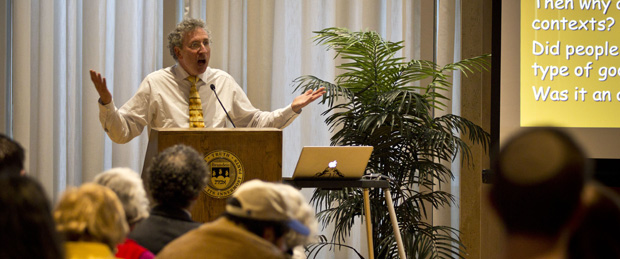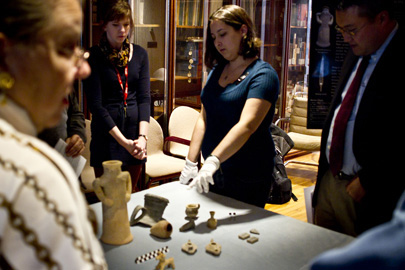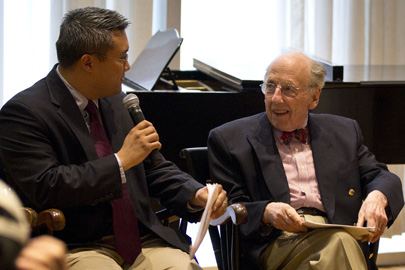Professors discuss import of Dead Sea Scrolls
Kickoff event held for educational collaboration with Museum of Science
 Photos/Ryan Scura
Photos/Ryan ScuraProfessor of Biblical Studies Marc Brettler asked, and answered, the question of why the scrolls are so significant.

Students spoke about displays they are preparing from Brandeis' collection of classical artifacts.

Professors Andrew J. Koh (left) and Michael J. Henchman emphasized the importance of modern analytical techniques.
Professors of Biblical studies, archaeology and chemistry gave members of the Brandeis community numerous answers to the question “Why are the Dead Sea Scrolls important?” at the April 23 kickoff of a five-month educational collaboration between the university and the Museum of Science in Boston.
The collaboration, which will provide a variety of learning opportunities for students and the Greater Boston community, centers on the Dead Sea Scrolls: Life in Ancient Times, an exhibition that opens at the Museum May 19 and continues through mid-October. The exhibit was created by the Israel Antiquities Authority from the collections of the Israeli National Treasures.
Marc Brettler, PhD, the Dora Golding Professor of Biblical Studies, told the audience in Rapaporte Treasure Hall that the scrolls are important because they help people distinguish Biblical Israel from ancient Israel and because, before their discovery, little was known about the late Second Temple era and the first century of Christianity.
“The Dead Sea Scrolls are important missing links,” said Brettler, who is chair of the Dead Sea Scrolls committee at Brandeis. “They help us understand how the Bible became the Bible and demonstrate how little Hebrew script has changed over the past 2,000 years.”
Emeritus Professor of Chemistry Michael J. Henchman, PhD, said Brandeis has been at the forefront of inquiry into the scrolls since the university’s founding and stressed the importance of science to those explorations. Modern analytical techniques were essential to proving the scrolls’ authenticity and restoring to readability text obscured over the ages.
Assistant Professor of Classical Studies Andrew J. Koh, PhD, agreed that recently developed technologies dramatically assist archaeology and other fields. “When people invented scanning electron microscopy, I guarantee you they weren’t thinking of studying pottery,” Koh said.
Students presented items from Brandeis’ collection of classical artifacts to introduce displays that they are preparing for the Mandel Humanities Center and Farber Library, both located on the Brandeis campus. Others described rituals surrounding food in the area where the scrolls were found.
Provost Steve A.N. Goldstein ’78, PhD, opened the kickoff event with thanks to Brandeis Board of Trustees Chairman Malcolm L. Sherman, a former chairman of the museum board, who brought the two institutions together for the collaboration.
Categories: Humanities and Social Sciences, Science and Technology





